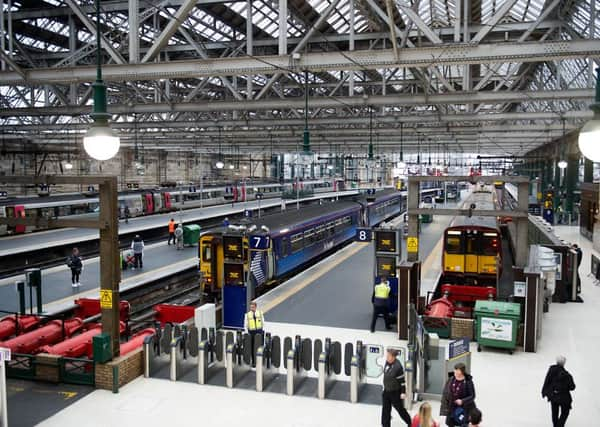Campaigners stage protests as commuters are hit by fares increase


Campaigners Action For Rail have called for a day of action after the average increase across Britain of 2.3 per cent came into force on Monday.
The trade-union backed group have organised demonstrations at more than 100 train stations throughout Tuesday, including in London, Birmingham, Manchester and Glasgow.
Advertisement
Hide AdAdvertisement
Hide AdThe rise in fares, which is the highest since January 2014 when they increased by 2.8 per cent, has been criticised by public transport campaigners.
Figures vary between operators, with fares on Virgin Trains East Coast services up by 4.9 per cent.
The increase was branded “another kick in the teeth for long-suffering rail passengers” by Lianna Etkind, of the Campaign for Better Transport.
She said: “Many experienced a less frequent and more overcrowded service last year, and now they are required to pay more for the same this year.
“The whole fares system is completely unfair and it’s high time the Government overhauled it.”
The Government uses the previous July’s retail prices index (RPI) measure of inflation to determine increases in regulated fares, which was 1.9 per cent.
These are around 40 per cent of all tickets and include season tickets on most commuter routes and some off-peak return tickets on long distance journeys.
Train operating companies set the prices of other tickets but are bound by competition rules.
Advertisement
Hide AdAdvertisement
Hide AdBruce Williamson, of independent campaign group Railfuture, called on the Government to use the Consumer Prices Index (CPI) for regulated fare rises rather than RPI, claiming it is a “much more accurate figure” for measuring inflation.
He said: “This is only 0.6 per cent, which would be a much more reasonable fare increase.”
According to the Rail Delivery Group (RDG), which represents train operators, around 97p in every pound paid by passengers goes back into running and improving services.
RDG chief executive Paul Plummer said: “Nobody wants to pay more to travel to work and at the moment in some places people aren’t getting the service they are paying for.
“However, increases to season tickets are set by government. Money from fares is helping to sustain investment in the longer, newer trains and more punctual journeys that passengers want.”
Virgin Trains East Coast said an overhaul of its pricing strategy means there will be 10,000 more discounted advanced fares available every week.
Transport Secretary Chris Grayling said: “We are delivering the biggest rail modernisation programme for more than a century, providing more seats and services.
“We have always fairly balanced the cost of this investment between the taxpayer and the passenger.”
Advertisement
Hide AdAdvertisement
Hide AdLabour analysis of ticket costs found the average commuter is handing over £594 more for a season ticket than when the Conservatives came to power.
The party looked at prices on nearly 200 routes and found some commuters are paying over £2,000 more to travel to work than in 2010.
It found the highest increase was a season ticket on Virgin Trains between Birmingham and London Euston, which will cost passengers £2,172 more in 2017 than 2010.